Elections are a big thing in Bangladesh. Going back to his village at peak season was an expensive option for my neighourhood fruit seller, Siddique Ali. The election wasn’t so critical in his case, as his candidate was going to get elected virtually unopposed. But he was going to vote all the same.
[wpvideo HTVifhpy]
My workaholic colleague Delower Hossain had also taken leave, not only to vote but to campaign for his candidate. Our electrician was working late into the night so he could get to Dinajpur in time. He too faced a one-sided election, but wasn’t going to take chances.
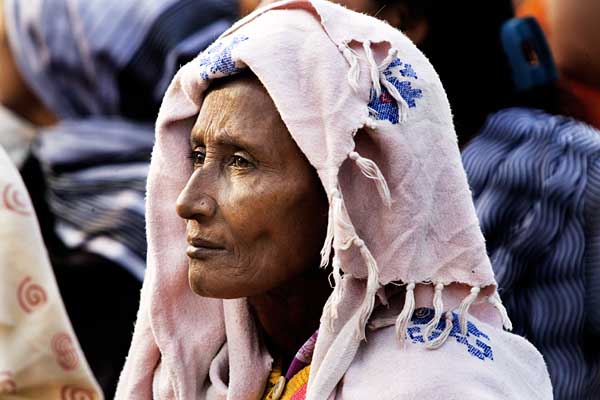
The euphoria in the streets was contagious. It felt good to be milling with the crowds. The smell of the street had its own magic. Contrary to the usual political rallies, These were not filled with hired crowd fillers or party goons, but people who genuinely loved their party and their leader.
[wpvideo FkWsP1kX]
Siddique Ali and Delower, like so many other ordinary Bangladeshis, were hard working, honest and politically astute. When I asked Siddique how well his candidate Shahjahan had done in his previous term, he gave a pragmatic answer. “He was an Awami League MP in a BNP government. You can’t expect him to achieve much.” Still, millions like Siddique and Delower voted. Still, they believed in the power of the people.
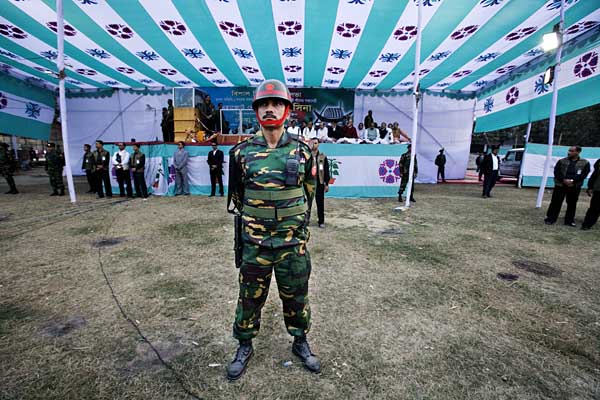
Parking my bicycle near the stadium I followed the crowd into Paltan. There were hundreds of policemen along the way, and everyone was being checked. My camera jacket and my dangling camera allowed me to get through several of the checks, but I did get stopped and politely asked to show the contents of my camera bag. There wasn’t the rudeness that greets one at a western airport, but they were making sure. Times had changed.

I remembered crowding around Hasina and Khaleda during the 1991 campaigns. Ershad had just been removed and there was hope in the air. Whoever won, we would have democracy. At least that was what we felt then
[wpvideo Knabiuhf]
As another military government was stepping down, I knew too well, that this elected government was unlikely to yield democracy outright. The young man with Hasina painted on his chest reminded me of Noor Hossain, the worker killed by Ershad’s police, because he had wanted “Democracy to be Freed”. I remembered that the autocratic general Ershad was back, an ally of the Awami League. And the party made up of war criminals, Jamaat, was on course, an ally of BNP.
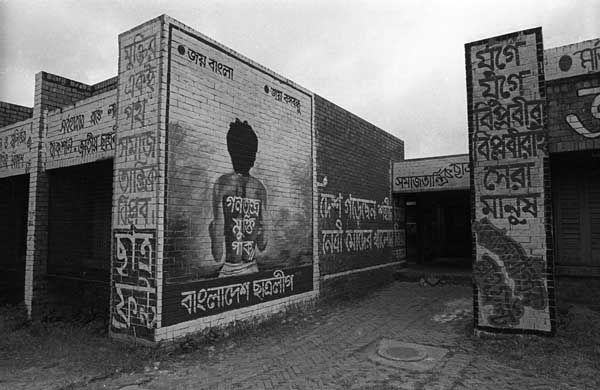
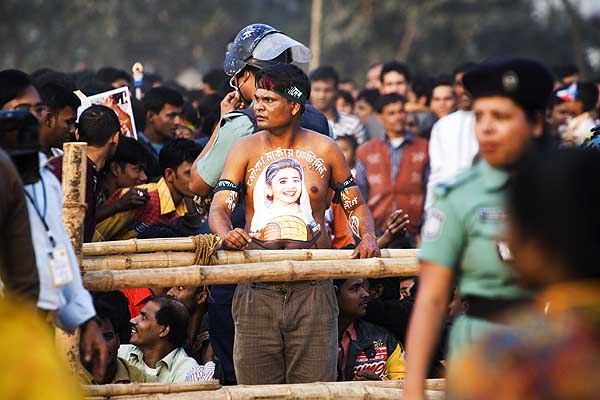
One could have predicted Hasina’s speech. There was not an iota of remorse. Not the slightest admission of wrong-doing. With the arrogance that has become her hallmark, she glorified her previous rule, and villified her opponent. And went on to insult the intelligence of the crowd by promising that every young man and woman would be given a job.
[wpvideo CjS3EEnl]
Through her proposed Internet revolution, no villager would ever again need to go to the city. The complete eradication of poverty was thrown in for good measure. The saying in Bangla ‘kothar upor tax nai’ “there is no tax on words” could not have been more apt.
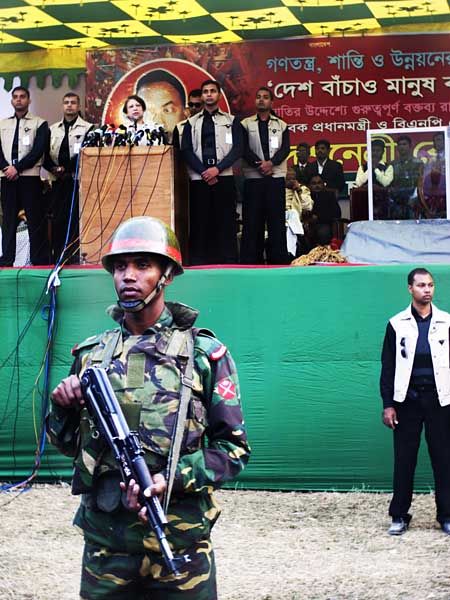
Khaleda, the following day, had done no less. Her promise of leaving no family homeless, was perhaps less extreme than the promise of a job for every youth, but it was still sheer hype. She too promised the magic of the computer, which apparently, could solve all problems. Having overseen the most corrupt five years of Bangladesh’s history.
[wpvideo hNh8k0IY]
Having had her second attempt at a rigged election derailed by a fighting opposition and a defiant public, she spoke of how, if voted into power, she would shape a corruption free Bangladesh! Bypassing the most blatant misdeeds of her sons and their cronies, she spoke of the ill deeds of her opponents. The master vote-stealer even warned of vote stealing. There was perhaps one significant difference between the two. Khaleda did acknowledge that perhaps some mistakes might have been made, and if so, apologised for them. Even such half admissions of blatant misdeeds, is a landmark in Bangladeshi politics.
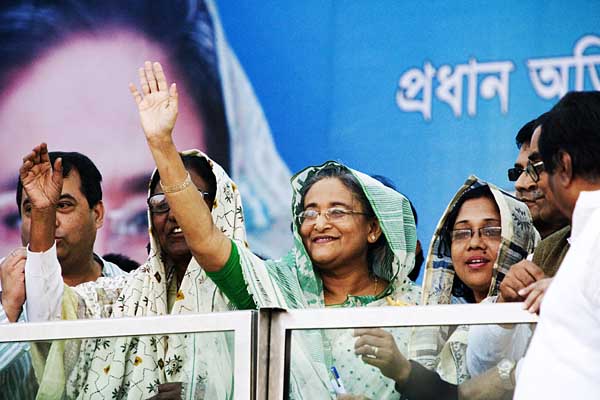
The security was less stringent for Khaleda, and I was able to get to the inner corral without being frisked or having my camera bag checked. Significantly, she chose not to use the bullet proof glass that had protected Hasina the day before. I had been surprised by the lack of women at Hasina’s rally, where I estimated less than a thousand women had gathered.
At Khaleda’s a rough head count yielded figures well below one fifty. Predictably however, there were many white capped men, and the yellow head bands of Jamaat’s militant student wing Shibir. Her’s was a more jubilant crowd, with slogans and chanting going on right through the rally, even during her speech. In comparison, Hasina’s rally had been a more reserved affair. Perhaps an indication of Khaleda’s younger following.
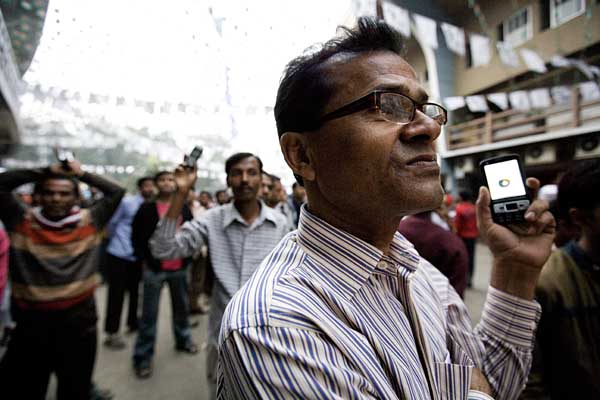
They had plenty of ammunition. Hasina reminded voters of the foreign bank accounts of Khaleda’s sons, and that the BNP had teamed up with war criminals. Khaleda reminded them of the one party rule of BAKSHAL, and the irony of Hasina’s statement that the partners of autocrats were traitors to the nation. Despite Khaleda’s tangential reference to ‘possible mistakes’, neither leader made any direct admission to any of the misdeeds that had ravaged the nation.
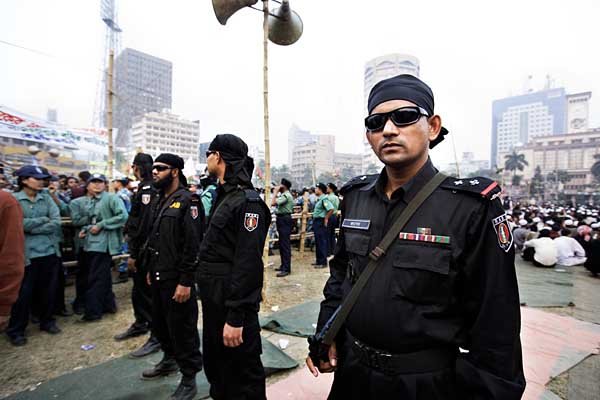
I felt insulted and humiliated. But I could not deny, that both leaders had their followers. Many of the people in the crowd did love them dearly, though there was little evidence to suggest that their leaders deserved, or respected this unrequited love.
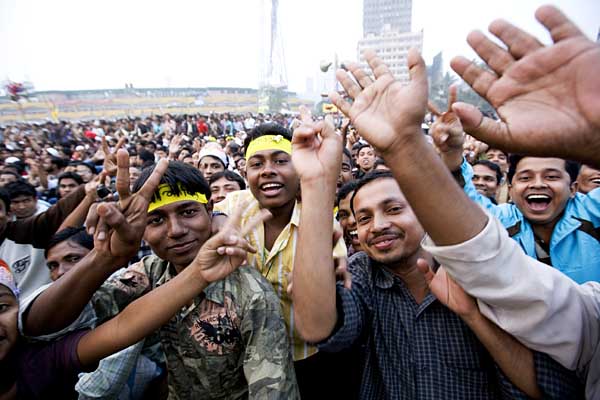
So why this great longing for an elected government? Why this great love for undeserving leaders? An election offers the one hope for a disenfranchised public to be heard. They cling on to these unlikely champions of democracy as their only real hope for a system of governance that may eventually value their will.
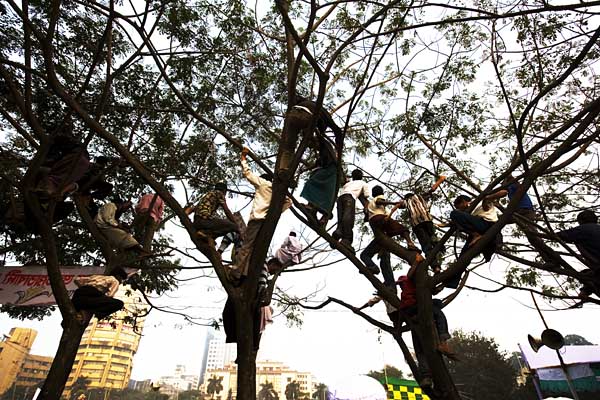
Hopefully the misadventures over the last two years has taught the military that the Bangladeshi public is a tough nut to crack. Even these two arrogant leaders face a more robust media and a more questioning public than they’ve been used to. Delower and Siddique Ali might not get the democracy they deserve, but their love for democracy, will eventually force a change.
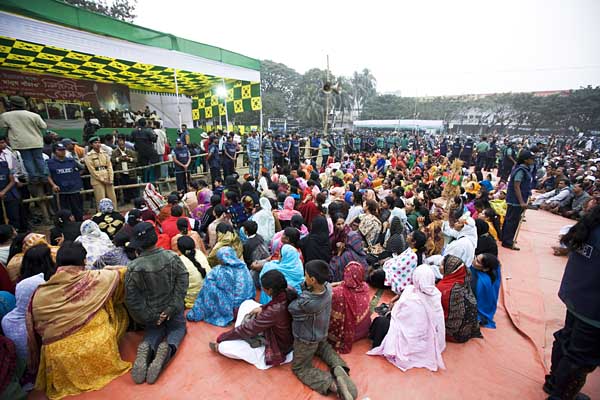
More election pictures at DrikNews.
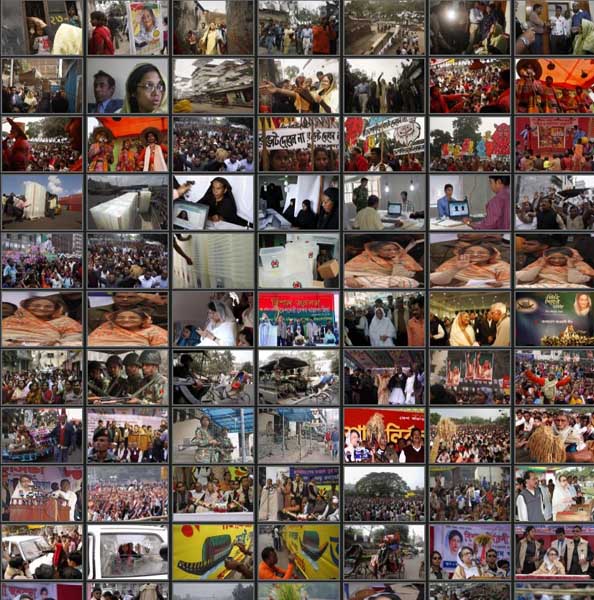
Musings by Shahidul Alam
- About
- About Me
- Awards
- Bangladesh Oil and Gas
- Bangladesh Related Events Worldwide
- BDR Rebellion updates
- Books
- Breaking News
- Breaking News II
- Calendar 2008
- Campus Protests
- Chobi Mela VI Updates
- CMV Exhibits I
- CMV Exhibits II
- CMV Exhibits III
- CMV Exhibits IV
- CMV Exhibits V
- CMV Exhibits VI
- CMV Exhibits VII
- CMV Phase II
- CMV Press
- CMV Updates
- Contests and Grants archive
- Contests, Exhibitions, Festivals and Conferences II
- Conversations
- Crossfire
- Drik ICT
- Drik India Updates
- Drik Related News
- Drik Updates
- Drik Videos
- DrikPath building
- Events at Drik Gallery
- Events at Drik Gallery II
- General News
- General News II
- General News III
- Grants Fellowships Residencies Scholarships
- Grants, Fellowships, Residencies, Scholarships etc., archives
- Humour
- Interesting Videos
- Internships
- Interviews
- Job Offer Archives
- Job Offers
- Majority World Updates
- Maps
- Media Academy
- Must See
- New Recruits
- News
- News Archives
- Pathshala Update IX
- Pathshala Updates
- Pathshala Updates II
- Pathshala Updates III
- Pathshala Updates IV
- Pathshala Updates V
- Pathshala Updates VI
- Pathshala Updates VII
- Pathshala Updates VIII
- Pathshala Updates X
- Picture of the Week
- Picture of the week II
- Presentations
- Rahnuma Ahmed's updates on Moshrefa Mishu
- Sample Page
- Southern Exposure
- Subscribe and Unsubscribe
- The Tide Will Turn
- The unfolding crisis in Pakistan
- Things friends have been up to
- Things friends have been upto II
- Webcasts
- Webinars
- Workshops Courses, Conferences, Seminars, Webinars
- Workshops, Courses and Conferences Archives
- Contests, Exhibitions, Conferences and Festivals
- Profile
[…] alexames wrote an interesting post today onHere’s a quick excerpt Elections are a big thing in Bangladesh. Going back to his village at peak season was an expensive option for my neighourhood fruit seller, Siddique Ali. The election wasn’t so critical in his case, as his candidate was going to get elected virtually unopposed. But he was going to vote all the same. My workaholic colleague Delower Hossain had also taken leave, not only to vote but to campaign for his candidate. Our electrician was working late into the night so he could get to Dinajpur in time. He too faced a one-sided election, but wasn’t going to take chances. […]
[…] acclaimed photo journalist Shahidul Alam takes a look at the Election campaigns in Bangladesh and comments on the election promises: “The saying in […]
Damn? I?m gonna take a look at this?
Hi
I was just passing by and saw your site. Excellent photos ! They are really atmospheric, you obviusly a good eye for the right shot! Vic